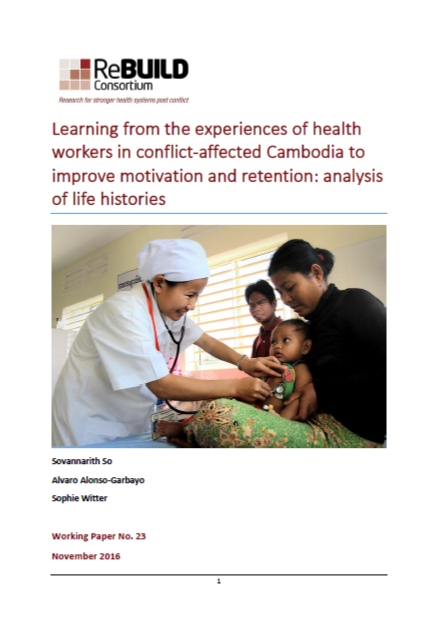Learning from the experiences of health workers in conflict-affected Cambodia to improve motivation and retention: analysis of life histories
 So, S., Alonso-Garbayo, A. and Witter, S. 2016. ReBUILD Working Paper 23
So, S., Alonso-Garbayo, A. and Witter, S. 2016. ReBUILD Working Paper 23
This working paper is an output of ReBUILD’s research into the evolution of health worker incentives in four post-conflict contexts (Cambodia, Sierra Leone, Uganda and Zimbabwe) in order to understand how to establish equitable access to quality health care in these health systems.
The working paper reports on the life-histories component of ReBUILD’s sub-study on health worker incentives in Cambodia. Two earlier reports have been published which analysed documents and key informant interviews for this project in Cambodia (So and Witter, 2016) and analysed HRH and other data to understand the impact of policies on district efficiency in Cambodia (Ensor et al. 2016). As well as providing the basis for recommendations for Cambodia, the findings will also feed into comparative cross-country analysis.
You can download the full working paper here.
Background:
Cambodia endured more than three decades of civil war and armed conflict, which finally ended in 1999, leaving a devastated health system and society. Coherent human resource for health (HRH) policies are needed to address the challenges faced in recruitment and retention of health workers, particularly in post-conflict countries. In Cambodia, there are remaining challenges in providing equitable healthcare for all due in part to the current HRH incentives, which drive an unequal distribution of the health workforce between urban and rural areas. There is therefore an urgent need for evidence based research that is policy driven and relevant to guide the Ministry of Health to effectively plan, manage and utilise its valuable human resources.
Conclusions:
This study adds to our understanding of health workers’ experiences of conflict and post-conflict periods and what can motivate them to stay in service during these challenging times. Developing a sense of mission and service can be particularly powerful during times of stress – staff can cope with difficult working conditions if they are supported by teams, families and communities. In the longer term, as the sector recovers, basic needs become more important and if the public sector is unable or unwilling to pay enough for health workers to provide for their families, then more flexible arrangements are needed, as illustrated by this case study. There also need to be more specific, funded and consistently implemented policies to retain staff in rural areas, such as allowances to reflect higher living costs for some items and reduced income generating opportunities.